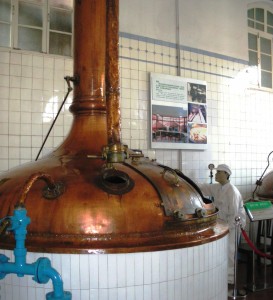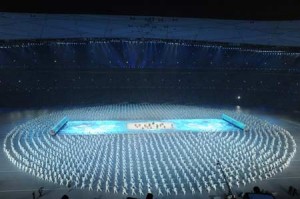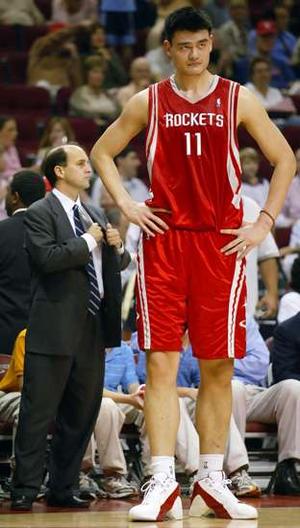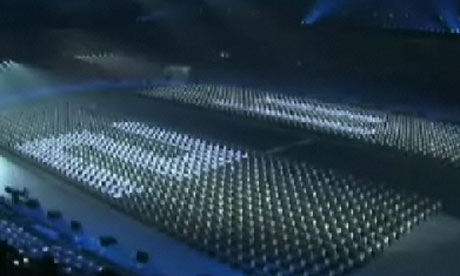 Qingdao - With the sailing race underway in this coastal Olympic host city, there is an undercurrent battle on for Olympic benefits between its two most respected commercial brands. Qingdao is often referred to as China’s brand capital. It is home to one of China’s most famous beers – Tsingtao – a lucky by-product of the country’s reviled period of colonial history. It is also the birthplace of China’s largest and now internationally recongised household appliance maker – Haier.
Qingdao - With the sailing race underway in this coastal Olympic host city, there is an undercurrent battle on for Olympic benefits between its two most respected commercial brands. Qingdao is often referred to as China’s brand capital. It is home to one of China’s most famous beers – Tsingtao – a lucky by-product of the country’s reviled period of colonial history. It is also the birthplace of China’s largest and now internationally recongised household appliance maker – Haier.
Both brands are sponsors of the Beijing games. As such Tsingtao has secured the right to sell its beer in designated Olympic facilities while Haier’s “green” products like solar-powered air conditioners have been installed in all main Olympic venues.
With more than a hundred years of history, Tsingtao is easily China’s oldest beer brand. It traces its origins back to the beginning of the 20th century when Qingdao was a colonial port administered by Germany and its masters introduced German beer-making techniques by building a brewery. Well aware of its “colonial” and aging image, Tsingtao has tried to capitalise on the appeal of the Olympics as a celebration of youthful sport to revamp the brand. “We don’t want our brand to be seen by young people as ‘my dad’s beer’,” says Yuan Xu, marketing president of the company.
For Haier, Beijing Olympics’ official claim to “greening the environment” has provided a stage to showcase its cutting-edge energy-saving products. Company leaders seem to be pleased. ”Olympic exposure has helped us push forward our goal of becoming a ‘globalised local brand’, “says Liang Haishan, vice-president of Haier Group.
There are those too that seem to have been left out from the bandwagon of Olympic economy. “I used to make 800 yuan (117 US dollars) a day but now because of visa restrictions and security my clients are fewer. I can only manage to make half the money,” says Xiao Jiang who sells sea shell trinkets and souvenirs at one of the stalls lining up Qingdao’s main promenade.
 The issue of “face” has always been an important one for a country, which values image and regulates relationships in ways that everyone can preserve “face”. But the decision of the games opening ceremony’s organisers to engineer a “pretty face” fakery for one of the most sublime moments of the gala has divided the country.
The issue of “face” has always been an important one for a country, which values image and regulates relationships in ways that everyone can preserve “face”. But the decision of the games opening ceremony’s organisers to engineer a “pretty face” fakery for one of the most sublime moments of the gala has divided the country.
The organisers banned seven-year-old Yang Peiyi from appearing on the stage because her round-shaped face with crooked teeth didn’t match the high criteria for perfection set for the pageantry. Spectators gathered at the Bird’s nest Olympic stadium on opening night heard Yang’s angelic voice render one of the country’s’ revolutionary anthems but saw another girl stand in for her.
“What a shame! Apparently it was deemed bad for China’s image to show a little girl with crooked teeth,” raged one blogger. “To ruin such an awesome ceremony with those fakes,” wrote another.
Interestingly though, the director for the opening ceremony – China’s internationally acclaimed film-maker Zhang Yimou, has had a rough ride in the past being accepted by the mainland public because of his penchant for depicting the “ugliness” of China.
His award-winning films in the past – “Raise the Red Lanterns” and “Ju Dou” — were decried by both ordinary people and intelligentsia for lifting the veil on dark and depressing sides of Chinese life. For a while, Zhang was regarded as a renegade that has made China lose face by putting forward the “ugly Chinese”.
The opening ceremony, which Zhang directed, marked a return for him to the embrace of the general public. “At last, he managed to show the splendour of China,” appraised real estate agent Fu Xiaoling. “It shows that foreigners can be impressed not only with the freaky feudal side of China but also with its beauty”.
But the uproar caused by his decision to fake the opening evening song shows the price paid for attempting to fake beauty.
While the skies over Beijing, a proud Olympic capital these days, remain annoyingly grey, the contrast with the azure horizon that spreads before Qingdao — an Olympics host city on China’s east coast — is striking. A former colonial port known mainly for its German-inspired ‘Tsingtao Beer’, Qingdao will host the world’s best sailors who have shown satisfaction with the environment and the first-class sailing facilities.
When asked about their Olympic preparedness, city leaders like to quote US presidential candidate Barack Obama: “Yes, we can.” Wang Wei, vice-president of Qingdao’s Olympic committee relates a series of challenges the city has had to face in the run up to the games — two typhoons, torrential rain and, most infamously, an attack of green algae.
“The green algae was our uninvited Olympic guest,” says Wang. Last month 32 percent of the sailing competition area was covered with the green weed and the city had to mobilise more than 2,000 vessels and some 10,000 people on land daily to get rid of the growth. Nothing is visible on the shimmering water surface fronting the city’s main promenade these days. Games organisers urge their guests not to leave the city before having experienced its “two famous foams” — the sea and the beer.
With the games gathering momentum in the Chinese capital, the country’s restive border regions have been rocked by ethnic unrest. A series of bombings and attacks on the Chinese police there are seen as expressions of long-stocked resentment of Muslim Uyghurs in Xinjiang province. But the capital’s officially designated protests zones have remained markedly complaint free.
On a Monday morning one of the demonstration zones — Ritan Park near the city’s eastern embassy district — was a perfect picture of harmony and peace. Adorned with red lanterns and flower arrangements, the park which once served as an imperial worship place to the Sun, provided sanctuary to elderly couples resting on wooden benches and young mothers pushing strollers under the trees. Next to a pond covered with pink lotuses a group of women was practicing their singing while tai chi practitioners were moving in slow and graceful motion.
Seemingly nothing suggested that this park – one of Beijing’s finest — has been approved by the authorities as a place for dissent. According to the announced rules, demonstrators have to register with the authorities well in advance and await approval before proceeding with planned protests. Asked if they knew of the ancient park’s new role as a place of free speech, several people shrugged and said they haven’t heard of it.
A woman extended as a free gift a sticker with a red heart crossed with the words, “Go China!” and sternly admonished me not to look for the negative side of life in China. But another elderly lady who gave her name as Sun was blunt: “Who would dare do anything to rattle the government these days? Only a madman!”
 China’s biggest revelry in years would be celebrated largely at home. With guardians of Beijing Olympics frowning at big parties and any spontaneous gatherings of more than 40 people, there will be no whipped to frenzy crowds and not even rowdy bar bashes.
China’s biggest revelry in years would be celebrated largely at home. With guardians of Beijing Olympics frowning at big parties and any spontaneous gatherings of more than 40 people, there will be no whipped to frenzy crowds and not even rowdy bar bashes.
Hours before fireworks announce the beginning of the lavish opening ceremony at the National Stadium, this capital city of 17 million is quiet, orderly and streets have been swept of their usual hustle and bustle.
“The laotaitai (elderly ladies) from our neighbourhood committee came around to tell us it would be better to stay at home and watch the ceremony on TV,” said Wang Guohua who intended to go to Tiananmen square and mingle with other people on the opening night.
The extravaganza would be performed in front of 90,000 carefully screened spectators and 80 foreign leaders. Strict security measures requiring spectators to enter the stadium four hours ahead of the show have been put in place. But for those who had waited for months for the big jamboree, the tickets they held retained the allure of golden tickets to the fantasy world of Willy Wonka’s Chocolate factory.
“I have made a qipao (Chinese gown) especially for the occasion,” said Canadian expat Alyssa Morin. “I’m terribly excited about watching it on site and wish we could crack a bottle of champagne to celebrate.”
China’s choice of towering basketball star Yao Ming — the country’s most recognisable international sports icon — to carry the national flag for the parade of nations at the opening ceremony Friday has generated predictable buzz in the media here.
Few media outlets omitted mentioning the choice as an endorsement of the nation’s respect for international celebrity and imposing height. Yao who stands at 2.28-metres and plays NBA’s centre, carried the flag for China in the 2004 Athens games. “It really excites me to do it once again, particularly on my home court,” he told reporters after a training session at the Olympic Basketball Stadium Thursday. “This won’t be the same as in Athens. The roar of the crowd could soar to such a height that I might have to put in earplugs.”

The choice of flag-bearer by the US team, which will see eye- to- eye with China on the top count of Olympic golds, seemed to have followed different criteria and was greeted with ominous silence by the media here. The US team captains opted to elect Lopez Lomong, middle distance runner — and former Sudanese refugee — to carry the stars and stripes. Their choice was announced hours after it became known that China had revoked the visa of US Olympic gold medalist Joey Cheek, a prominent critic of China’s reputed role in the humanitarian crisis in Sudan.
Lomong is a Darfur refugee who fled Sudan at six and lived in a refugee camp in Kenya for 10 years before settling down in the US. One of the “Lost Boys of Sudan”, Lomong is an outspoken member of Cheek’s Team Darfur. He said that if he wins a medal in China, he will ”hold an American flag and a Sudan flag” on the medal stand.
In recent days Beijingers have spent more time discussing the weather and its capricious nature in August than the weather-obsessed inhabitants of the British Isles. Many have been gripped by superstitious fear that nature will unleash its irrational wrath on the Beijing Olympic Games’ parade and spoil the host’s dazzling opening ceremony. Will it rain? Or will it storm?
The broadcast of a minute-long video clip of the dress rehearsal for the Beijing Olympics opening ceremony has caused anger and embarrassment. Chinese organisers, who had made participants and the selected audience sign confidentiality agreements to keep the content of the ceremony secret, hit at the perpetrators for stealing the surprise out of the pageantry.
